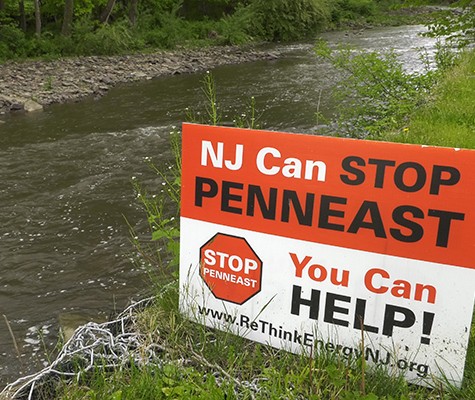
Analysis Shows PennEast Ignores Significant Pipeline Capacity Built Since Spring 2014
FAR HILLS, NJ (March 10, 2020) – The latest expert analysis from Skipping Stone energy consultants found that PennEast has failed to demonstrate public need for its new proposal to build the pipeline in two phases, and that only the corporate owners of the project would benefit.
PennEast recently proposed to build its pipeline in two phases, completing construction in Pennsylvania before extending the pipeline into New Jersey. The new proposal fails to provide any current economic justification for the project and ignores extensive pipeline development since 2015 that has added to the glut of capacity serving New Jersey and eastern Pennsylvania.
Specifically, the analysis found that since the spring of 2014, completed pipeline projects have added over 4 billion cubic feet of daily capacity serving the same region that PennEast would serve. This represents 10 times the amount of capacity that phase I of the project would deliver, and four times the amount that both phases would deliver (1 billion cubic feet). PennEast bases their economic rationale for the project on a study conducted of the 2013/2014 winter, ignoring the capacity added since then.
New Jersey Conservation Foundation and The Watershed Institute commissioned the analysis for a filing with the Federal Energy Regulatory Commission (FERC) challenging the need for the new phased project.
“There is zero economic or market justification for this new project from the data provided by PennEast,” said Greg Lander, president of Skipping Stone, a global energy markets consulting and technology services firm launched by former energy CEOs. “It is critical to note that today, five years after PennEast’s initial filing, the market supply and market demand facts of 2020 bear no resemblance to those of the 2013/2014 winter used by PennEast for the 2015 application.”
Also, according to Lander, PennEast’s new plan to split the project into two phases makes phase 1 not economically viable as the stand-alone project that PennEast asserts it is; and, PennEast has provided no market data updated to 2019 let alone 2020 to support any public benefit.
Lander concluded that the only potential benefit from the project is to its corporate owners — New Jersey Resources, South Jersey Industries, Spectra, and UGI — who gain financially from their ability to depreciate the project and reduce their taxes. In response to a protest filed by New Jersey Conservation Foundation and the Watershed Institute, PennEast disclosed that the customers for phase one of the project are the regulated affiliates of these companies: New Jersey Natural Gas, South Jersey Gas, Elizabethtown Gas and UGI, raising more questions about the public need for the project.
“The PennEast project has become a tax gimmick that would only benefit the companies behind it, while condemning private property and preserved open space, damaging pristine streams, and bringing more dirty energy into New Jersey,” said Tom Gilbert, campaign director, New Jersey Conservation Foundation and ReThink Energy NJ. “It would jeopardize the health and safety of our communities while providing no public benefit.”